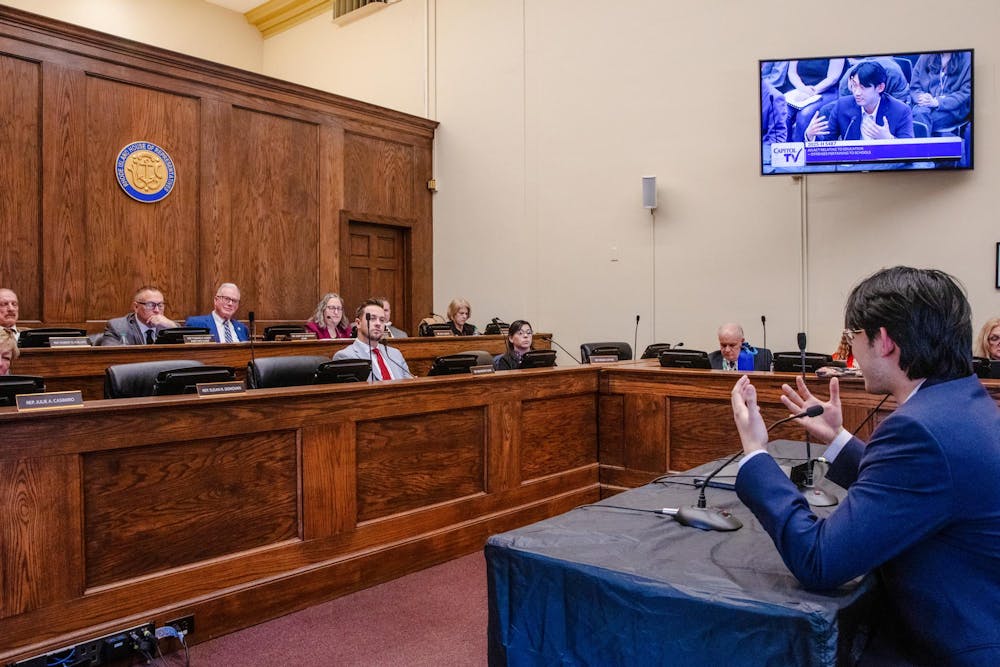On Tuesday, the Rhode Island House Education Committee held a public hearing on a bill that proposes ending legacy admissions. At the hearing, several Brown students testified in support of the bill, which was co-introduced by Brown activist group Students for Educational Equity and Rep. David Morales MPA’19 (D-Providence).
If enacted, this legislation would prohibit all R.I. universities — including private institutions like Brown — from giving preference in admissions to students whose relatives previously attended the school. California passed a similar bill in September 2024.
SEE introduced a predecessor to this bill in last year’s legislative session, but it died in committee, The Herald previously reported. Because this year’s bill was introduced in February — more than two months earlier in the legislative session than last year’s — the student organization hopes it has a higher chance of passing.
Before reintroducing it this year, SEE refined the bill’s language to focus more on fairness rather than equity, said Eliana Rivas Marte ’27, co-lead of SEE’s Admissions and Access committee.
SEE’s campaign to end legacy admissions at Brown dates back to the group’s founding in 2019, according to SEE Co-President Nick Lee ’26. Legacy admissions “is a chief mechanism for perpetuating class inequities at Brown,” he said.
A July 2023 study by Brown and Harvard economists found that applicants from families in the top 0.1% of earners are over 2.7 times more likely to attend Brown than those from the bottom 20%. The study noted that legacy admissions — among other non-academic considerations — are a driving factor in this disparity, The Herald previously reported.
In his testimony at the State House on Tuesday, Lee argued that “the privilege of bloodline” should not be a factor in university admissions.
In a previous interview with The Herald, President Christina Paxson P’19 P’MD’20 said that if the University “were concerned primarily with socioeconomic diversity, it would make sense to eliminate” legacy admissions.
But Paxson noted that the practice “lets alumni know that we really want their students at Brown,” which helps “build a sense of community.”
The University’s “legacy students are now much more diverse, and they will become increasingly so as time goes on,” she added. Brown’s Ad Hoc Committee on Admissions Policies released a spring 2024 report stating that though “removing legacy preferences could lead to somewhat more diversity in the group of admitted students,” the effect would be “modest.”
In his testimony on Tuesday, San Kwon ’25 quoted some of Paxson’s comments to argue that Brown would not voluntarily eliminate its legacy admissions policy — necessitating legislative intervention.
The committee “continues to examine the feedback shared with the University regarding the role of family connections in admissions,” wrote University Spokesperson Brian Clark in an email to The Herald.
At a digital student forum hosted by the committee earlier this semester, all eight student speakers expressed opposition to the practice. The committee “hosted a similar forum for faculty and staff” the week prior, Provost Francis Doyle wrote in an email to The Herald at the time, and has also solicited feedback from alums through a letter by Paxson in the Brown Alumni Magazine.
At Tuesday’s hearing, Rivas Marte shared her experience as a first-generation college student and immigrant from the Dominican Republic. “I had no idea how the college application process worked,” she said. “I had to search all over the city for opportunities, fight for the ones that I found and work relentlessly to achieve my goals.”
“The college application game is already skewed towards privileged students,” she added.
During her testimony, Ava McKie ’28 noted that higher education institutions “are abandoning students of color and low-income students.”
She claimed that the Supreme Court’s 2023 ruling eliminating race-conscious admissions policies has already made it more difficult for students of color to access elite institutions. Legacy admissions only exacerbates this issue, she added.
“I got into Brown out of sheer luck, while many other exceptional students of color were passed over,” she said.
Brown’s class of 2028 — the first class admitted after the 2023 ruling — saw a 40% decrease in Black students and a 29% decrease in Hispanic students, The Herald previously reported.
Morales emphasized that eliminating legacy preference would help ensure that college admissions are based on merit rather than inherited privilege.
“The practice of legacy admissions brings unfair advantages to a certain group of students,” Morales said. “In doing so, it reinforces disparities in access to higher education.”

Annika Singh is a senior staff writer from Singapore who enjoys rewatching Succession and cheating on the NYT crossword.





